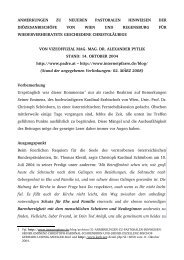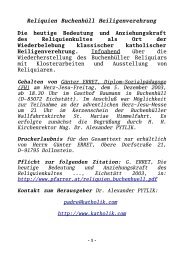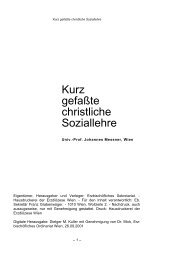- Page 1 and 2:
PONTIFICIA UNIVERSITAS LATERANENSIS
- Page 3 and 4:
INDICE GENERALE PREFAZIONE 12 - 13
- Page 5 and 6:
II.2.4 La legge naturale come natur
- Page 7 and 8:
II.5.5 Fondazione di diritto natura
- Page 9 and 10:
III.3.2 Ragione di stato 194 - 196
- Page 11 and 12:
V.2 Critiche e risposte concernenti
- Page 13 and 14:
sforzo conoscitivo per tornare a co
- Page 15 and 16:
0 INTRODUZIONE - CAPITOLO INTRODUTT
- Page 17 and 18:
grafia "ss" nella scrittura del cog
- Page 19 and 20:
Nel capitolo I "LA VITA E LE OPERE
- Page 21 and 22:
evitare ingiusti rigori a causa di
- Page 23 and 24:
Dopo aver frequentato la scuola ele
- Page 25 and 26:
professori rimasero importanti per
- Page 27 and 28:
Così abbiamo visto che Messner si
- Page 29 and 30:
Dopo la morte del fondatore del sol
- Page 31 and 32:
Questi aveva sempre sostenuto che u
- Page 33 and 34:
governi Dollfuß e Schuschnigg. Dal
- Page 35 and 36:
ivolte alla realizzazione dei fini
- Page 37 and 38:
Per Messner, società classista e l
- Page 39 and 40:
ealtà sociale, ma vuole indicare a
- Page 41 and 42:
I.3 Il suo soggiorno in Inghilterra
- Page 43 and 44:
Nonostante la sua capacità di pres
- Page 45 and 46:
Dr. theol. 76 ; Friburgo i. B.: Dr.
- Page 47 and 48:
Excursus: Lo sviluppo della sua pos
- Page 49 and 50:
II LA TEORIA DEL DIRITTO NATURALE I
- Page 51 and 52:
mentre l'anima è di essenza spirit
- Page 53 and 54:
considerare l'efficacia delle stess
- Page 55 and 56:
"conserva moderazione, comportati i
- Page 57 and 58:
possibile soltanto per un essere sp
- Page 59 and 60:
sua definizione di moralità e l'es
- Page 61 and 62:
sociale davanti alla realtà social
- Page 63 and 64:
particolari, anzi possono ricevere
- Page 65 and 66:
l'interruzione fosse necessaria per
- Page 67 and 68:
verso i valori - Wertstreben). Ques
- Page 69 and 70:
corrispondono all'essenza fondament
- Page 71 and 72:
giustezza di impulsi, come Messner
- Page 73 and 74:
soltanto del bene, ma anche dell'ob
- Page 75 and 76:
felicità significa adempimento del
- Page 77 and 78:
Sottolineando così l'ontologico st
- Page 79 and 80:
naturale morale è legge in quel do
- Page 81 and 82:
ene e male di un comportamento mora
- Page 83 and 84:
dottrina giusnaturalistica tradizio
- Page 85 and 86:
soprattutto quelle allo stadio prim
- Page 87 and 88:
della moralità pubblica di una soc
- Page 89 and 90:
può pretendere differenti modi di
- Page 91 and 92:
dunque mutevole nella sua efficacia
- Page 93 and 94:
persona. Ciò a cui è chiamato l'u
- Page 95 and 96:
scelti. II.3.3 Il fine e il compito
- Page 97 and 98:
enessere (Wohlfahrtsordnung). Qui i
- Page 99 and 100:
di autorizzazione, ogni diritto è
- Page 101 and 102:
dell'uomo gli insegna circa le pret
- Page 103 and 104:
3. Differente dal precedente caso d
- Page 105 and 106:
coscienza giuridica dell'uomo. Inol
- Page 107 and 108:
¡ ¡ ¡ "Ordine" si riferisce all'
- Page 109 and 110:
ealtà? Se sì, è questa realtà s
- Page 111 and 112:
Per Messner seguono due fatti fonda
- Page 113 and 114:
Con lo sviluppo della coscienza giu
- Page 115 and 116:
S. Tommaso e nella scolastica quest
- Page 117 and 118:
quanto prescrizione della ragione d
- Page 119 and 120:
specialmente della natura dell'uomo
- Page 121 and 122:
proprio. Il vero bene della comunit
- Page 123 and 124:
teologica, l'empirico-storica e l'i
- Page 125 and 126:
pieno-umana condizionata dalla vita
- Page 127 and 128:
Il fatto, che si tratta di princíp
- Page 129 and 130:
sempre nuove possono causare pretes
- Page 131 and 132:
la coscienza giuridica trova subito
- Page 133 and 134:
negli storici ordinamenti giuridici
- Page 135 and 136:
del sovrano della società statale
- Page 137 and 138:
del diritto legiferato. Equità sig
- Page 139 and 140:
partecipi alla legislazione possono
- Page 141 and 142:
Il carattere della virtù della giu
- Page 143 and 144:
vengono scelte dai singoli popoli p
- Page 145 and 146:
fisicamente e psichicamente. Poi ve
- Page 147 and 148:
partecipazione alle forme singoli d
- Page 149 and 150:
impulso fondamentale." 205 Il risul
- Page 151 and 152:
alla fase di poter autoconservarsi
- Page 153 and 154:
società. La causa di obbligo (Verp
- Page 155 and 156:
III I FONDAMENTI DELL'ETICA SOCIALE
- Page 157 and 158:
III.1.2 La riforma sociale La rifor
- Page 159 and 160:
compendio (Grundriß) dell'ordine s
- Page 161 and 162:
autoritario" le condizioni di inter
- Page 163 and 164:
Critica sociale significa esaminare
- Page 165 and 166:
III.2 Matrimonio e famiglia III.2.1
- Page 167 and 168:
concerne la società in generale. A
- Page 169 and 170:
vivere una volta. III.2.3 La famigl
- Page 171 and 172:
Il concetto di educazione in riferi
- Page 173 and 174:
3. il diritto dei genitori all'erez
- Page 175 and 176:
giardino di casa sarebbe una parte
- Page 177 and 178:
premuroso per la comunità e i suoi
- Page 179 and 180:
generalmente più alto e 2. nella s
- Page 181 and 182:
nascite da parte di affetti di una
- Page 183 and 184:
Scheler giustamente che l'uomo non
- Page 185 and 186:
Messner constata che la maggioranza
- Page 187 and 188:
propria se i bambini possano stare
- Page 189 and 190:
adesso un aspetto della funzione gi
- Page 191 and 192:
conciliabile con la concezione gius
- Page 193 and 194:
costituzione: 253 1. Il rivolgiment
- Page 195 and 196:
pazientemente un attacco contro il
- Page 197 and 198:
III.3.3 Governo autoritario e sinda
- Page 199 and 200:
vera guerra civile; 2. che tali mis
- Page 201 and 202:
III.3.4 La fondazione del potere pu
- Page 203 and 204:
da parte dell'eredità e dell'ambie
- Page 205 and 206:
altri mezzi condurrebbero all'insuc
- Page 207 and 208:
non solo eviterà influssi dannosi
- Page 209 and 210:
e un mezzo di un'unica comunità po
- Page 211 and 212:
nazione. Le opinioni concernenti il
- Page 213 and 214:
III.3.8 La proprietà privata La pr
- Page 215 and 216:
indipendente dal caso e dalla viole
- Page 217 and 218:
sul benessere economico-sociale del
- Page 219 and 220:
Il concetto della giustizia sociale
- Page 221 and 222:
lavoratori avrebbero preteso "di es
- Page 223 and 224:
oggetto delle considerazioni. Così
- Page 225 and 226: principio del bene comune e il prin
- Page 227 and 228: moderna società (...) L'individuo
- Page 229 and 230: IV.2.3 Ancora nessuna "terza" via A
- Page 231 and 232: IV.3 Influsso permanente di Messner
- Page 233 and 234: Messner stessa scrive sulla fondazi
- Page 235 and 236: che noi abbiamo già visto ampiamen
- Page 237 and 238: iferire giustamente anche alla dott
- Page 239 and 240: le ricerche di Messner, dalla rivel
- Page 241 and 242: supponit naturam. E in quanto il di
- Page 243 and 244: Univ.-Prof. DDr. Johannes Messner
- Page 245 and 246: avrebbe avuto si "comprensioni demo
- Page 247 and 248: mortale della riforma. La discussio
- Page 249 and 250: economica adempie ad una funzione d
- Page 251 and 252: V.1.2.2 All'esperimento dello stato
- Page 253 and 254: Si mostra qui di nuovo il "dualismo
- Page 255 and 256: QA: "Da parte del governo non ci fu
- Page 257 and 258: all'ex cancelliere federale Dollfu
- Page 259 and 260: contrasto politico-pratico (certame
- Page 261 and 262: Lì Diamant ha evidentemente ignora
- Page 263 and 264: V.1.3.2 Annotazioni al rimprovero e
- Page 265 and 266: ontologicamente, nell'essere e nell
- Page 267 and 268: Se con Herbert Schambeck capiamo fi
- Page 269 and 270: V.2 Critiche e risposte concernenti
- Page 271 and 272: alta gioia per gli adulti, e il lor
- Page 273 and 274: Riguardo alla storicità Messner ri
- Page 275: della contraccezione artificiale os
- Page 279 and 280: non ha scelto la via puramente onto
- Page 281 and 282: V.3 La fondazione e l'attività del
- Page 283 and 284: tutte le ulteriori ricerche. Fino a
- Page 285 and 286: simposio internazionale dal 24 al 2
- Page 287 and 288: abbia trovato nuove energie, guarda
- Page 289 and 290: correnti realistiche del cattolices
- Page 291 and 292: opera di Messner Das Naturrecht ("I
- Page 293 and 294: Messner, e naturalmente dell'intero
- Page 295 and 296: Attraverso l'esperienza l'uomo impa
- Page 297 and 298: del diritto naturale all'apriori mo
- Page 299 and 300: giuridico positivo porta in sé dir
- Page 301 and 302: non possono raggiungere una forza g
- Page 303 and 304: diritto naturale può adempiere sem
- Page 305 and 306: Concludiamo con un sommario incompl
- Page 307 and 308: valori (Wertstreben). Messner scriv
- Page 309 and 310: approvazione della giusta autonomia
- Page 311 and 312: maturità e l'utilità in riferimen
- Page 313 and 314: Nelle sue parole di ringraziamento
- Page 315 and 316: VII BIBLIOGRAFIA VII.1 Opere di Joh
- Page 317 and 318: Liverpool, 1950 MESSNER J., Das Nat
- Page 319 and 320: MESSNER J., Das Naturrecht. Handbuc
- Page 321 and 322: MESSNER J., Kulturethik mit Grundle
- Page 323 and 324: Wissenschaft, zur Jubiläumsversamm
- Page 325 and 326: MESSNER J., Brauer, Th., Der Gemein
- Page 327 and 328:
MESSNER J., Kautz, H., Im Schatten
- Page 329 and 330:
MESSNER J., Meffert, F., Karitas un
- Page 331 and 332:
MESSNER J., Erhelenz, A., Moderne S
- Page 333 and 334:
"Katholische Gesellschaftslehre", P
- Page 335 and 336:
MESSNER J., art. "Sozialkonservativ
- Page 337 and 338:
Paderborn; ders., Christus unser Id
- Page 339 and 340:
MESSNER J., De Viti De Marco, A., G
- Page 341 and 342:
MESSNER J., Freiheit und Gesetz - W
- Page 343 and 344:
MESSNER J., Wandel der englischen D
- Page 345 and 346:
MESSNER J., Fuchs, J., Lex naturae.
- Page 347 and 348:
MESSNER J., Hommes, J., Krise der F
- Page 349 and 350:
MESSNER J., Die Herren der Welt: Am
- Page 351 and 352:
MESSNER J., "Humanistische Weltansc
- Page 353 and 354:
MESSNER J., Die Hochschule in der w
- Page 355 and 356:
MESSNER J., Das Gemeinwohl im Laiss
- Page 357 and 358:
MESSNER J., Die Institution und Fun
- Page 359 and 360:
MESSNER J., Revolutionärer Dynamis
- Page 361 and 362:
MESSNER J., Der Zustand der röm.-k
- Page 363 and 364:
MESSNER J., Nothelfer für Zeiten,
- Page 365 and 366:
MESSNER J., art. "Sozialkritik", in
- Page 367 and 368:
MESSNER J., Die Wirtschaft in den L
- Page 369 and 370:
W./ZSIFKOVITS V. (edit.), Katholisc
- Page 371 and 372:
VII.3 Opere di autori AMBROSETTI G.
- Page 373 and 374:
D'AGOSTINO F., Dimensioni dell'equi
- Page 375 and 376:
FIGL T., Kultur und Ethik. Eine his
- Page 377 and 378:
HÖVER G., Erfahrung und Vernunft.
- Page 379 and 380:
Johannes Messner , Pamplona - Navar
- Page 381 and 382:
GESELLSCHAFT, Beiträge zum Naturre
- Page 383 and 384:
Sozialethik wird wieder aufgelegt."
- Page 385 and 386:
SCHELER M., Der ethische Formalismu
- Page 387 and 388:
SPANN O., Der wahre Staat, Jena ²1
- Page 389 and 390:
WEILER R., Die soziale Botschaft de
- Page 391 and 392:
VII.4 Saggi e articoli di autori AB
- Page 393 and 394:
Rassegna Critica di Filosofia e di
- Page 395 and 396:
11/12 (agosto/settembre 1935), 14 -
- Page 397 and 398:
34 (22 marzo 1991) GOGELLI M. L., J
- Page 399 and 400:
DIE FURCHE, n. 41 (8 ottobre 1992)
- Page 401 and 402:
HÖVER G., Zur Begründung der Mens
- Page 403 and 404:
KLOSE A., Ein Pionier der Sozialleh
- Page 405 and 406:
in Verbindung mit Alfred Klose und
- Page 407 and 408:
München ²1980, 1346 - 1383 MARTIN
- Page 409 and 410:
Messner zum 90. Geburtstag, Berlin
- Page 411 and 412:
PRANTNER R., Kulturethik und die al
- Page 413 and 414:
excolendam, in: LÖW R. (edit.), OI
- Page 415 and 416:
Wien - München ²1980, 2894 - 2921
- Page 417 and 418:
1815, vol. 22, Wien-München 1987,
- Page 419 and 420:
SERIAUX A., La dignité humaine, pr
- Page 421 and 422:
filosofiche e teologiche, in: CIANI
- Page 423 and 424:
WEILER R., Das Naturrecht im Vergle
- Page 425 and 426:
1984), Berlin 1985 , 9 - 19, oppure
- Page 427 and 428:
W./ZSIFKOVITS V. (edit.), Katholisc
- Page 429:
VII.6 Johannes Messner in internet


![15. L'intera tesi [pdf]: diritto naturale ed](https://img.yumpu.com/746932/277/500x640/15-lintera-tesi-pdf-diritto-naturale-ed.jpg)


